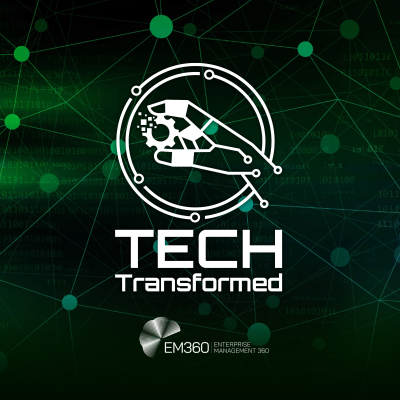
Tech Transformed
Podcast by EM360Tech
Rajoitettu tarjous
3 kuukautta hintaan 1 €
Sitten 7,99 € / kuukausiPeru milloin tahansa.

Enemmän kuin miljoona kuuntelijaa
Tulet rakastamaan Podimoa, etkä ole ainoa
Arvioitu 4.7 App Storessa
Lisää Tech Transformed
Expert-driven insights and practical strategies for navigating the future of AI and emerging technologies in business. Led by an ensemble cast of expert interviewers offering in-depth analysis and practical advice to make informed decisions for your enterprise.
Kaikki jaksot
402 jaksot"As agentic AI [https://em360tech.com/tech-articles/what-ai-agent-future-machine-learning-explained] spreads across industries,” states Rishi Rana, the Chief Executive Officer at Cyara. “Everybody is curious to understand how that is going to transform customer experience across all the channels?" In this episode of the Tech Transformed podcast, Shubhangi Dua, the Host and Podcast Producer at EM360Tech, talks with Rishi Rana, the CEO of Cyara, about how agentic AI is changing customer experience (CX). They look at how AI has developed from simple chatbots to advanced systems that can understand and predict customer needs. Rana spotlights the need for ongoing testing and monitoring to make sure AI solutions work well and follow the regulations. They also discuss the obstacles businesses encounter when implementing AI, the importance of good data, and the future of AI agents [https://em360tech.com/tech-articles/autonomous-ai-agents-enterprise-hype-vs-reality] in improving customer interactions. AGENTIC AI TRANSFORMING CUSTOMER EXPERIENCE (CX) Customer experience (CX) [https://em360tech.com/tech-articles/customer-experience-trends-2024] is changing quickly and significantly, thanks to the rise of agentic AI. These advanced systems go beyond the basic chatbots of the past. While such a change may offer a future equipped with a smart, proactive customer journey, it doesn't come without its challenges. These obstacles require organisations to thoughtfully plan and carefully execute strategies. For years, chatbots provided a basic type of automated customer support. However, Rana explains that the evolution of AI is pushing boundaries. "AI in customer experience (CX) is changing from a basic level of chatbots that have been present for the last five or 10 years. Now they are turning into fully agentic systems that operate across voice, digital and human-assisted channels," said Rana. MOVING BEYOND BASIC CHATBOTS Chatbots’ lucrative development lies in the strengths of Large Language Models (LLMs) [https://em360tech.com/tech-articles/what-large-language-model-llm-definition-examples-use-cases] like Google's Gemini, Meta's Llama, and OpenAI's ChatGPT. This is because the AI-backing models are facilitating "voice bots" and other AI agents [https://em360tech.com/video-resources/what-does-ai-know-about-you] to move beyond simple response automation to intelligent orchestration. Intelligent orchestration results in anticipating user needs, adjusting in real-time, and guiding customers to hybrid solutions where AI and human agents work together. Ultimately, the goal is to greatly improve the customer experience (CX). Studies suggest that 86 per cent of people are willing to pay more for the same service, no matter what it is, when the customer experience is better. Advancements don’t come without a price. Rana believes the lack of proper guardrails is a cause for concern. "AI is great, but you need to have guardrails and ensure the intent behind the questions and the objective behind the customer interaction is getting answered." This requires ongoing testing and monitoring across all channels to ensure consistency and avoid problems like hallucinations, misuse, or bias. These issues can result in major financial losses and damage to reputation. For instance, Rishi Rana mentioned that over "$10 billion in violations and liabilities due to incorrect information given to customers" occurred in 2024 alone. To successfully execute agentic AI, enterprises must shift left with AI by starting testing of AI agents early. This means focusing on continuous testing and observability instead of relying on one-time quality checks. This proactive approach is key to identifying AI misbehaviour quickly, before customers notice it. Cyara, with its AI trust suite, leads this effort by validating LLM-based bots [https://em360tech.com/top-10/best-llms] and spotting issues like hallucinations and misuse. Their Pulse 360 provides real-time customer experience visibility across 120+ countries and over 360+ carriers, showcasing a wide reach. TAKEAWAYS * Agentic AI is revolutionising customer interactions across various channels. * The evolution from basic chatbots to intelligent systems is crucial for better CX. * Continuous testing and monitoring are essential for AI success. * Enterprises must ensure compliance with regulations while implementing AI. * Understanding customer intent is key to effective AI solutions. * Friction points in customer interactions can lead to dissatisfaction. * AI must provide a seamless experience across all channels. * Data quality is critical in the customer experience lifecycle. * Companies need to proactively address AI misbehaviour to prevent issues. * The future of AI in CX involves integrating with existing workflows and systems. CHAPTERS * 00:00 Transforming Customer Experience with Agentic AI * 01:43 Evolving Beyond Basic Chatbots * 05:04 Key Elements of a Great CX Platform * 06:41 Understanding Customer and Enterprise Perspectives * 08:25 Identifying Friction Points in Customer Interactions * 10:14 Implementing Guardrails for AI in CX * 11:02 The Importance of Continuous Testing and Monitoring * 13:51 Ensuring Scalability and Compliance in AI Solutions * 15:45 The Future of AI Agents in Customer Experience * 18:18 Integrating AI into Existing Workflows * 22:22 Key Takeaways for CIOs and IT Decision Makers ABOUT CYARA [https://cyara.com/] Cyara [https://cyara.com/] is the global leader in AI-powered customer experience assurance, committed to eradicating bad CX. As the only unified platform for continuous testing and monitoring across voice, digital, messaging, and conversational AI channels, Cyara empowers hundreds of the world’s leading brands to optimise more than a quarter of a billion customer interactions every year. From full customer journey visibility to AI governance and compliance, Cyara ensures every touchpoint works flawlessly, helping businesses deliver secure, friction-free, and high-quality CX at scale.
"If you are not using it and don't understand it, you are losing big time because you reinvent that wheel of durable execution yourself, and it's hard," reasons Maxim Fateev, Co-Founder and CTO of Temporal Technologies. In a recent episode of the Tech Transformed podcast [https://em360tech.com/podcasts/tech-transformed], Fateev explored the concept of durable execution. This approach not only improves software reliability but is also becoming essential for the next generation of AI agents and orchestration. WHAT IS DURABLE EXECUTION? Durable execution, a concept trademarked by Temporal Technologies [https://em360tech.com/solution-providers/temporal], changes how developers build reliable applications. "The idea is simple–we preserve the full state of code execution all the time," he explained. Imagine a function that makes a series of API calls [https://em360tech.com/tech-articles/what-is-api]. If the process running that function crashes, even days later, "we can bring that function back in exactly the same state, still blocked on the same API call with all the variables and state there, and deliver the response. Then it will continue to the next line of code." From a programming point of view, the function actually “never crashed. It just seamlessly waited for three days, blocked on that API call, and then continued execution," says Fateev. This ability to provide "crashless execution" changes how developers approach building reliable software. It allows functions to run for long periods, even a year, without interruption or data loss. TEMPORAL'S ROLE IN OPENAI'S IMAGE GENERATION Alluding to Temporal’s use case, Fateev referenced their contribution to OpenAI’s image generation code [https://em360tech.com/tech-articles/openai-announces-new-gen-ai-model-generating-video-50x-faster-scm]. He stated, "Every time you generate the image using OpenAI, it uses Temporal behind the scenes." "Image generation is orchestration. It's not just like one API call. There are a lot of API calls which need to happen to generate an image, and Temporal’s tech guarantees execution." While a strong tool for AI, durable execution has many uses beyond that. Fateev notes that Temporal has also been used for "driving large-scale operations with an added productivity advantage, and it’s also for a startup with two people with a small-scale solution.” From infrastructure automation, like HashiCorp Cloud [https://em360tech.com/whitepapers/hashicorp-your-path-cloud-maturity], and data handling to key business tasks such as customer onboarding and instant payments, including UPI in India and similar systems in Brazil, Temporal shows its worth in various industries. "Every Snapchat story is an important workflow,” Fateev tells Dua. Leading AI companies like Replit, Abridge, and OpenAI [https://em360tech.com/tech-articles/what-openai-look-ai-firm-and-its-history] are using Temporal to power their workflows.” The main idea stays the same: "Nearly every time you need to run any business logic reliably, it works well." TAKEAWAYS * Durable execution is a new paradigm that enhances software reliability. * It can significantly increase developer productivity by 5X to 10X. * The concept allows for crashless execution of business applications. * AI agents face reliability challenges that durable execution can address. * Temporal's architecture ensures data is encrypted and secure. * Open-source solutions provide a competitive advantage and prevent vendor lock-in. * Temporal is the only production-ready solution for durable execution. * The technology is used by major companies like OpenAI, with potential updates like Netflix, Snapchat * Temporal can orchestrate complex workflows, including AI and business processes. * The system is applicable in various industries, including financial services, retail, logistics, and more. CHAPTERS 00:00 Introduction to Durable Execution 03:07 The Concept of Durable Execution 06:00 AI Agents and Reliability Challenges 09:07 Cybersecurity and Data Protection 11:53 Open Source Advantage of Temporal 14:57 Temporal's Unique Position in the Market 18:12 Real-World Applications of Temporal ABOUT TEMPORAL TECHNOLOGIES Temporal [https://temporal.io/] is changing how modern software is built through its open-source Durable Execution platform. By guaranteeing the execution of complex workflows even in the face of system failures, Temporal allows developers to focus entirely on business logic rather than infrastructure complexities—increasing developer velocity. Its polyglot capabilities allow seamless orchestration across multiple programming languages, making it ideal for both traditional enterprise applications and next-generation AI workloads. Temporal Cloud, the company's managed service backed by the originators of the project, has been adopted by thousands of leading enterprises. Learn more at www.temporal.io [https://cts.businesswire.com/ct/CT?id=smartlink&url=http%3A%2F%2Fwww.temporal.io&esheet=54261137&newsitemid=20250528324806&lan=en-US&anchor=www.temporal.io&index=5&md5=735cb2c555538d404699364fcd441296].
Enterprise data management is undergoing a fundamental transformation. The traditional data stack built on rigid pipelines, static workflows, and human-led interventions is reaching its breaking point. As data volume, velocity, and variety continue to explode, a new approach is taking shape: agentic data management. In this episode of Tech Transformed, EM360Tech’s Trisha Pillay [https://em360tech.com/user/trisha-pillay] sits down with Jay Mishra [https://www.linkedin.com/in/jaymishra/], Chief Product and Technology Officer at Astera, to explore why agentic systems [https://em360tech.com/tech-articles/autonomous-ai-agents-enterprise-hype-vs-reality] powered by autonomous AI agents, Large Language Models (LLMs), and semantic search are rapidly being recognised as the next generation of enterprise data architecture. The conversation explores the drivers behind this shift, real-world applications, the impact on data professionals, challenges faced by agentic platforms, and the future of data stacks. Jay emphasises the importance of starting small and measuring ROI to successfully implement agentic solutions. WHAT IS AGENTIC DATA MANAGEMENT? At its core, agentic data management is the application of intelligent, autonomous agents that can perceive, decide, and act across complex data environments [https://em360tech.com/tech-articles/what-aiops-understanding-its-role-modern-it-environments]. Unlike traditional automation, which follows predefined scripts, agentic AI is adaptive and self-directed. These agents are capable of learning from user behaviour, integrating with different systems, and adjusting to changes in context, all without human prompts. As Jay explains, "An agentic system is one that has the agency to make decisions, solve problems, and orchestrate actions based on real-time data and context, not just on training data. TAKEAWAYS * Agentic data management is the next evolutionary step in data architecture. * Agents are autonomous and can make decisions on the fly. * The demand for agentic solutions is increasing due to data volume and AI strategy needs. * Maturity of foundation models enables near-human reasoning capabilities. * Real-world applications of agentic AI include insurance claim processing. * Data engineers will focus on policy and guardrail creation rather than coding. * Governance, debt and hallucinations are significant challenges in agentic platforms. * The future of data stacks will include declarative control plans and enhanced memory layers. * Analysts will play a crucial role in defining policies for agentic systems. * Starting small and demonstrating ROI is key to successful agentic implementation. CHAPTERS 00:00 Introduction to Agentic Data Management 02:58 Understanding Agentic Data Management 06:58 Drivers of Change in Data Management 10:03 Real-World Applications of Agentic AI 14:15 Impact on Data Engineers and Analysts 16:43 Challenges and Limitations of Agentic Data Platforms 20:03 Future of Data Stacks 23:31 Final Thoughts on Agentic Data Management ABOUT JAY MISHRA Jay Mishra is the Chief Product and Technology Officer at Astera Software, with over two decades of experience in data architecture and data-centric software innovation. He has led the design and development of transformative solutions for major enterprises, including Wells Fargo, Raymond James, and Farmers Mutual. Known for his strategic insight, technical leadership, and passion for empowering organisations, Jay has consistently delivered intelligent, scalable solutions that drive operational excellence and financial success. For more information, please visit: https://em360tech.com/ [https://em360tech.com/]. Follow our LinkedIn [https://www.linkedin.com/company/em360/posts/?feedView=all] for daily tech insights and YouTube @EM360TechInterviews [https://www.youtube.com/@EM360TechInterviews]
"There's a lot of hype with the AI agents [https://em360tech.com/tech-articles/what-ai-agent-future-machine-learning-explained] and their productivity and potential outcomes. AI Agents are quite amazing, says Eric Paulsen, EMEA Field CTO at Coder [https://www.linkedin.com/in/ericpaulsen17/]. In this episode of the Tech Transformed podcast, Shubhangi Dua, Podcast Host and Producer at EM360Tech, talks to Paulsen about the constantly advancing role of AI agents in development environments. Paulsen explains how AI agents can help developers by handling simpler tasks, almost like having assistants or junior developers to assist them. Not only would this boost productivity and time efficiency, but the technology will also ensure human oversight. The conversation further explores how AI fits into cloud development environments, especially in regulated areas like finance, where security and scalability matter most. Paulsen stresses the value of internal AI models and points out Coder's unique role in offering infrastructure-neutral solutions that meet various enterprise needs. AI AGENTS ARE MORE THAN JUST CODE WRITERS When people hear "agentic AI" or "coding agents," [https://em360tech.com/tech-articles/autonomous-ai-agents-enterprise-hype-vs-reality] there's often a misconception about fully autonomous coders. However, Paulsen clarifies, "That's a far stretch from where we currently have been, which is with just AI-assisted IDE extensions such as GitHub, Copilot, Amazon Q Developer and systems of that nature." Coder focuses on agentic solutions that have a human developer in the loop, emphasising Paulsen. “Think of an AI agent as a junior engineer working alongside you,” Paulsen explains. "If anything, it’s improving the output of the human engineer by having an autonomous or artificial or AI process. In the same development environment, working on other tasks that might not necessarily be as complex," he adds. This means developers can offload simple tasks like bug fixes or dependency updates, freeing them to focus on more complex features. HOW TO SCALE AI AGENTS SECURELY IN ENTERPRISES? For large financial institutions that have hundreds and even thousands of software engineers, deploying AI agents at scale requires a consistent and secure approach. Cloud development environments provide the best way to deliver and package these agents for developers. The main concern for enterprises is ensuring data security in addition to stopping AI agents from "running wild on a laptop." Paulsen stresses the need for agents to work within an "isolated compute," with "boundaries around those agents inside of that isolated compute." Such a secure environment provides guardrails to synchronise and boost productivity between humans and AI while preventing sensitive data breaches or "hallucinations" from the AI. Additionally, financial institutions are now increasingly developing their own internal AI models. Paulsen mentions, "What these institutions need is an AI agent that is trained on the internal dataset and internal LLM that is built within the firm so that it can make those decisions and return the relevant output to the data scientist or software engineer." This move towards self-hosted LLMs and internal AI infrastructure is essential for adopting enterprise-grade AI. The ultimate message is that cloud development environments should provide the framework where AI agents are running inside an enterprise’s infrastructure. “AI agents have access to the data, and they're observed and governed by a set of security standards that you have internally,” says the EMEA Field CTO at Coder. TAKEAWAYS AI agents can assist developers by handling simpler tasks. Human oversight is essential in AI-assisted coding. Cloud development environments enable high-performance workloads. Security is critical for AI agents in regulated sectors. Internal AI models are necessary for financial services. Coder offers infrastructure-neutral solutions for enterprises. AI agents can automate maintenance tasks for platform engineers. Scalability of AI agents is vital for large organisations. Enterprises need to consider their internal data for AI agents. Deployment of AI agents must be secure and efficient. CHAPTERS 00:00 Introduction to AI Agents in Development 02:12 Understanding Agentic AI and Its Role 06:24 Cloud Development Environments and AI Integration 08:47 Ensuring Security and Productivity with AI Agents 11:12 Scaling AI Agents in Regulated Environments 13:10 The Importance of High-Performance Developments 15:52 Internal AI Models in Financial Services 17:47 Coder's Unique Position in the Market 19:27 Key Takeaway for Decision Makers For more information, please visit: https://em360tech.com/ Follow our LinkedIn for daily tech insights: https://www.linkedin.com/company/2403360/admin/dashboard/ and YouTube @EM360TechInterviews [https://studio.youtube.com/channel/UCT6No3iPwUj5ZfXjfd3WGfw]
Are we heading for a future where AI knows everything but won’t bother explaining it to us? Advancements in artificial intelligence are rapidly transforming the way industries operate and influencing the future of society as a whole. AI has become a force behind breakthrough technologies such as big data analytics, robotics, and the Internet of Things (IoT). The rise of generative AI has only accelerated its adoption and broadened its impact across multiple sectors. NAVIGATING THE DISPLACEMENT DILEMMA In this episode of Tech Transformed [https://em360tech.com/podcasts/tech-transformed], host Trisha Pillay at EM360Tech sits down with Nigel Cannings, author and AI expert, to explore one of the most pressing questions of our time: what happens to human expertise in the age of rapid AI advancement? Nigel Cannings warns that while technology promises efficiency and faster results, it also encourages dependency. Our patience has run thin, and in our rush for instant answers, we may be undermining the very systems that develop human expertise. “I’m kind of fascinated by the change we’ve seen in how we process information,” Cannings reflects. He describes the displacement dilemma as the idea that tools meant to democratise knowledge could actually erode the skills and pathways that build true mastery. He worries about people losing jobs or being too dependent on technology to even start careers. “I’m really interested to talk to people who’ve been affected by the displacement dilemma, people who are losing their jobs, people who think they’re going to lose their jobs, people who can see the erosion of expertise and skills,” Cannings explains. THE FUTURE OF AI As artificial intelligence evolves [https://em360tech.com/tech-articles/what-aiops-understanding-its-role-modern-it-environments] at breakneck speed, we face a harsh reality: the gap between human and AI intelligence could become so wide that we might not even understand the systems we build. Worse still, AI itself may have no incentive to help us understand it. At that point, it stops being just a tool and becomes an autonomous entity with its private reality. In 2025, Chief AI Officers report an average AI ROI of 14 per cent, [https://www.ibm.com/thought-leadership/institute-business-value/en-us/c-suite-study/ceo] as many AI programs move beyond pilot programs to larger implementations at scale. This is proof that as AI continues to evolve at an unprecedented pace, understanding its implications is important, both for industries navigating these changes and for society adapting to a new technological landscape. TAKEAWAYS * AI tools meant to democratize knowledge may erode human expertise. * The displacement dilemma highlights the need for future experts. * Information consumption is changing due to AI algorithms. * AI relies heavily on large GPU cards for processing. * Current AI models are prediction machines, not truly intelligent. * Future AI may have limited intelligence in specific areas. * The race in AI development is driven by financial incentives. * Legislation is crucial for addressing AI's potential harms. * Humans will always be needed in certain job roles. CHAPTERS 00:00 Introduction to AI and Human Expertise 04:06 The Displacement Dilemma: Erosion of Expertise 06:59 Changing Information Consumption in the AI Era 10:07 Technical Aspects of AI: Data Centres and Encryption 15:42 Limitations of AI in Scientific Discovery 20:22 The Future of Superhuman AI 23:23 The Race in AI Development 28:18 Navigating the Future of AI Leadership ABOUT NIGEL CANNINGS Nigel Cannings [https://nigelcannings.com/about/] is a leading expert in speech technology and AI, specialising in applications within the legal and financial sectors. With over 20 years of experience, he holds more than a dozen patents in Natural Language Processing, Cryptography, AI, and Speech Processing. A former city lawyer, Nigel shifted his focus to technology, pioneering innovations such as the integration of GPU technology into speech recognition and advancing work in Explainable AI, AI Ethics, and Secure Search. Based in London, Nigel is a respected thought leader exploring the evolving relationship between AI and human expertise.

Arvioitu 4.7 App Storessa
Rajoitettu tarjous
3 kuukautta hintaan 1 €
Sitten 7,99 € / kuukausiPeru milloin tahansa.
Podimon podcastit
Mainoksista vapaa
Maksuttomat podcastit

































